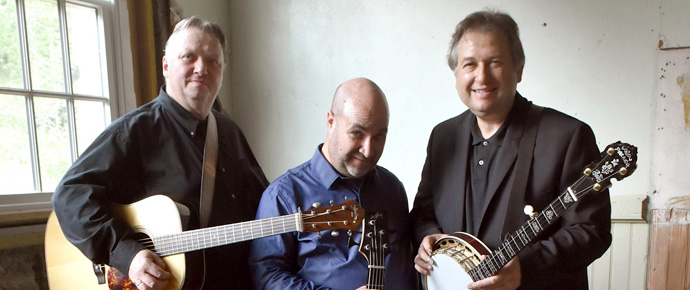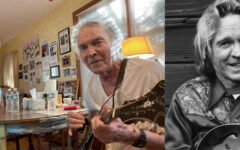
The Kruger Brothers are an ideal example of the impact bluegrass has made on music, even on those who live far from American shores. It was that profound impression that lured brothers Jens and Uwe Kruger away from their native Switzerland and subsequently resettle in North Carolina where they could explore the roots of that style firsthand. It became a pilgrimage of sorts, one that found them personally connecting their soon-to-be mentor Doc Watson, and also delving deeply into the sounds of Bill Monroe, Flatt and Scruggs and other champions of traditional American music. The albums they’ve recorded since offer a tribute to the idea that indeed, America is a melting pot, and the sounds that were birthed from the heartland find a universal touchstone.
“We first heard country and bluegrass when we were very little,” Jens recalls. “It must have been in the early ‘60s. Our father had some albums by Chet Atkins, Hank Snow, Eddy Arnold and a few more. We both loved singing and we began playing various instruments as early as four or five years of age. I always liked the sound of the banjo, and after playing some accordion and harmonica, I began playing the banjo in 1973. Uwe had played on all the instruments in the house as long as I can remember, and he started playing guitar on a regular basis around 1969.”
“The first real bluegrass music we had at home was a sampler of Flatt and Scruggs, Country Gentlemen and various other bluegrass bands that Jens received for Christmas in 1974,” Uwe adds. “That double album got us started. Next came Flatt and Scruggs’ Golden Hits Collection, with the early classics like Foggy Mountain Breakdown, Cabin in the Hills and so on. We wore those records out.”
Their move to America came after an invitation to perform at MerleFest in 1997, which is where they first met Doc Watson. Subsequent trips to America followed as their bookings became more frequent. At the same time, they developed a warm relationship with Watson, who made a habit of inviting the brothers to his house where he would invite them to join him in making music.
“My brother and I had been full time professional musicians since 1979, and our business was good in Europe,” Jens explains. “We played many shows in a variety of musical styles and enjoyed a great following. At first we had absolutely no desire to build a new business on a new continent. However, our constant music travels were hard on my wife and our two daughters. So, at one point in 2002, I asked my family to consider a move to the U.S. to see if we would like it, and whether Uwe, Joel and I could build a U.S. based music career. We were in our late 30s at that time, and so I knew that it would be now or never. And, of course, there was always the option to move back to Europe if it didn’t work out.”
With bassist Joel Landsberg in tow, the Kruger Brothers can currently claim more than 20 albums, all of which offer homage to bluegrass in its many shades. Their latest effort, Roan Mountain Suite, is a collaboration with the Kontras Quartet and a commissioned work about the majestic mountains that straddle the border of North Carolina and Tennessee. Named for the prominent peak that inspires many a scenic gaze, the work forges a link with such contemporary classics as Ferde Grofé’s Grand Canyon Suite and the many Aaron Copeland compositions that offer homage to the American ethos in sight and song. A series of seven movements that seamlessly merge chamber music and strings with the traditional sounds of banjo and guitar, it reveals a sound that’s both simple and suggestive. Indeed, within its idyllic environs, the music ebbs and flows with ease and inspiration.
At its most basic, Roan Mountain Suite becomes a tribute to a conspicuous corner of the American landscape, a place where an essential style originated and prospered. In a larger sense however, it represents a melding of culture and creativity, a goal the Krugers have always aspired to.
“Bluegrass music appeals to a lot of people in different countries for different reasons,” Uwe insists. “Bluegrass in Switzerland has a different audience than in Germany and Austria. The Dutch have their own take on it, as do the Belgians and the French. Italy is still another scene, but I think the skill the musicians display on their acoustic instruments, and the drive and melodic bows that dazzle audiences are the things that win friends and admirers all over.”
“American music forms in general create a strong influence all over the world,” Jens explains. “Bluegrass is just one of these wonderful results of America’s cultural melting pot. Bluegrass has everything. It has social and human values, virtuosity, both simplicity and sophistication, as well as diversity.”
Clearly, it’s that love that inspires them even today, a full fifteen years after they opted to make their move. “I fell in love with American music as a child,” Uwe reflects. “It has been with me through trials and hardship, through travel and companionship. It is part of me, of my soul. I could not be without it, and therefore it will always be an integral part of my music, and the music that we create as the Kruger Brothers. The freedom to let my European roots contribute just a little part to the ever-evolving body of American folk music is worth living for, and a very humbling experience. I am very thankful for the opportunity to share.”
With those thoughts in mind, Jens sums things up succinctly. “As long as we have fun, make people happy, and don’t take ourselves too seriously, all is good and every day a gift.”







